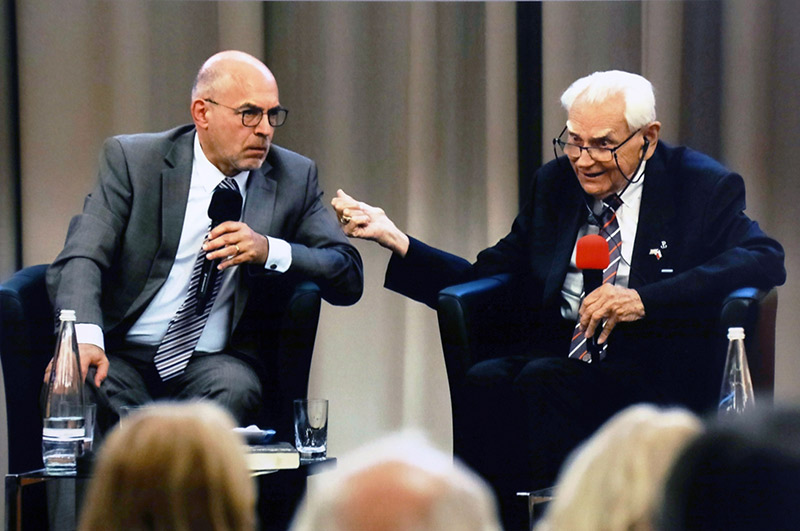UTEP Professor Promotes Peace at WWII Ceremony
Last Updated on November 04, 2019 at 12:00 AM
Originally published November 04, 2019
By Daniel Perez
UTEP Communications
At 91 years old, Z. Anthony Kruszewski has seen a lot and heard a lot - good and bad. As a young man, he battled the Nazis during World War II as a member of the Polish Underground. He spent some time as a prisoner of war, but managed to escape. By the end of the hostilities, he was so embittered that he claimed to have been allergic to the German language.

But that was a lifetime ago. Through the years, Kruszewski, Ph.D., professor emeritus of political science at The University of Texas at El Paso, came to terms with his dislike for all things German. As an educator, he would accept frequent invitations to lecture at the country’s universities and eventually became friends with his academic peers there.
Kruszewski, who continues to teach at UTEP despite officially retiring in 2015, recently participated in a pair of ceremonies in Berlin, Germany, to mark the 80th anniversary of the start of World War II on Sept. 1, 1939. The topic of his brief remarks for the first event was the effect of the conflict on his family, many who died horribly at the hands of the Nazis. At the second event, he spoke more about his participation as a Polish soldier and spy during the Warsaw Uprising 75 years ago.
Back in El Paso, he recalled his concern with how the mostly German audiences would react to his speeches that condemned nationalism and authoritarian activities that could lead to war. The native of Warsaw, Poland, said the crowds of several hundred at each event interrupted him numerous times … with applause and standing ovations.
“Their response was significant,” said Kruszewski, who said he kept his emotions in check during his presentations. “It was very moving for me. I did not expect it. I did not expect the Germans to invite me to speak in Berlin as a representative of veterans of World War II and, to a certain extent, a generation of people who fought for freedom. It made me feel satisfied and fulfilled.”
Kruszewski was the right person to deliver that message because he was of the generation that experienced the drama and tragedy of war, said Dieter Bingen, Ph.D., former director of the German-Poland Institute in Darmstadt, Germany. The two met at an academic conference in Cologne, Germany, in 1982 and have been colleagues and friends ever since. Bingen, whose research specialty was Poland, organized the Sept. 1 event in Berlin and invited his friend to be the keynote speaker.
Bingen, now retired, said he knew that Kruszewski would win over the crowd with a speech that demonstrated his intellect, temperament, morality and acceptance. That day’s audience included high-powered, nationally elected leaders from Germany and Poland.
“By his experiences, I knew his message would build bridges between nations and generations,” Bingen said in an email interview.
Bingen said that Kruszewski followed that up with an hour-long presentation the next day in Berlin’s city hall. The UTEP professor spoke of his work with the Polish Underground. The organizer said his friend’s words evoked strong emotions among the audience made up of children, young adults, academics and social activists.
Kruszewski called the German invasion of Poland the greatest tragedy in his home country’s history because of the level of destruction and loss of six million lives, or every fifth Polish resident. He called his own survival a miracle. He said his first war-related job was to report fires in the community. He went on to join the underground and serve in communication and reconnaissance.
Kruszewski, who spoke German, recalled his capture by an older German soldier. The man was Austrian and warned him that he had up to three days to escape otherwise the Nazis would execute him. He escaped during a convoy and continued to fight with the resistance through the end of the war.
After hostilities ended, he refused to return to Poland for 15 years because the Soviet Union controlled it. Instead, he went to England and then to study in the United States, which eventually led to his job at UTEP, where he has served with distinction for 50 years.
José D. Villalobos, Ph.D., associate professor of political science at UTEP, said he was familiar with Kruszewski’s life story and believes it is the reason he is such an unparalleled force on campus as a mentor who pushes colleagues and students to work hard and succeed through perseverance.
Villalobos, who serves on his department’s student scholarship committee, acknowledged that many graduate and undergraduate students have benefitted from the numerous scholarships tied to the Kruszewski family, as well as the pipeline he has created to recruit extremely talented students from Poland.
“In my experience at UTEP that has just surpassed a decade, I have experienced a slice of Dr. Kruszewski’s myriad contributions that are a testament to his legacy that is synonymous with our standards for access and excellence in political science and the Miner community more broadly,” Villalobos said.
Through the years, Kruszewski has supported Polish opposition to Communism and the now independent Poland as a member of the Polish-American congress. For the past 20 years, the UTEP professor has split time between El Paso and Warsaw, where he offers political science lectures to junior faculty from former republics of the Soviet Union at the University of Warsaw every summer. He teaches these instructors, who were taught under Communism, about elections, feminism, minority rights and European civilization.
As for his presentations in Berlin, he hoped that his contribution generated additional awareness to a different generation of the horrors of war.
“For me it’s an old story of 80 years ago,” Kruszewski said. “I’ve made peace with Germany. This generation that is alive now is not guilty. They are not guilty of the crimes of their fathers and grandfathers.”